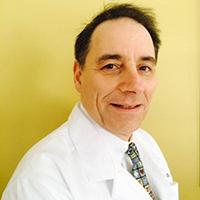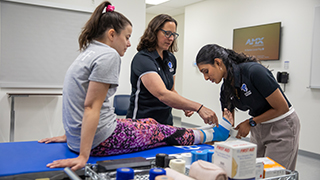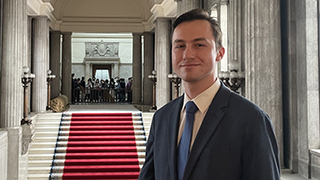An interview with Catholic Studies and School of Nursing Professor Anthony Carlino M.D. Ph.D.
Thursday, May 21, 2015

Here is an interview with Dr. Carlino:
What exactly attracted Dr. Carlino to teach this course for SHU?
About two years ago I mentioned to Dean Kaiser, whom I’ve known for a
half dozen years or so, that I’d like to contribute somehow to
undergraduate education at a Catholic university. The intention was to
sort of hybridize my life as a physician, scientist, educator and
Catholic Christian. Soon after, I met with Ines Murzaku, the
chairperson of Catholic Studies, and Dean Kaiser. Dr. Murzaku proposed
that I develop a course in medical humanities for Catholic Studies and
the School of Nursing.
My thought was to construct a seminar style course for upper level undergraduates. I supposed that many of the students would have their eye on a life in healthcare. The objective of the course is to gain an understanding of the human condition and to take up aspects of human experience that are often encountered in a healthcare relationship. Through readings and discussion we take up, for example, how people live, how they die, the manifestations of professionalism, end of life decisions, and the experience of being ill. The hope is that we’ll all approach the care of our patients thoughtfully appreciating that our patients are fully human and not to be summarized by their disease processes.
Can you tell us how your course relates to the Catholic Intellectual Tradition?
The Catholic Intellectual Tradition defines an approach to study of
the world. It’s a way of looking at the world that can inform the study
of just about everything – chemistry, politics, literature, medicine,
etc., Fundamentally, it’s about integrating faith and reason. This
approach typically goes on quietly and without notice except to the
person engaged in study. Through our class discussions and my reading of
the students’ reflection papers, I noted that many of the students are
people of faith and actively applying this intellectual tradition.
This is probably the first time for you teaching undergraduates, how did you find
SHU students?
Yes. This is the first time I’m working with undergraduates; I spend
the bulk of my time mentoring medical students and medical residents.
In the Humanism in Healthcare class there were 14 students; the vast
majority were nursing students or pre-med students. Many of the
students had experience working with patients as part of a clinical
rotation or as part of an extra-curricular activity. In a word, I found
the students delightful. They were fresh, jubilant and full of zeal
for hearing about and discussing the human aspect of medicine.
Moreover, they were thoughtful souls. I feel certain that those
students planning to work in healthcare are committed to a life of
service and doing the right things for their patients.
We have never had a MD teaching for Catholic Studies before. How did you find your
SHU colleagues?
I’d say that they’ve been very supportive of this adventure and
certainly very welcoming. As I noted, Dean Kaiser introduced me to Dr.
Murzaku knowing that I was interested in somehow contributing to the
formation of undergraduates interested in healthcare. And Dr. Murzaku
specifically brought up the idea of a course in medical humanities. From
that came a valuable meeting with Deans Foley and Gardner from the
School of Nursing. Dr. Murzaku has been extraordinarily helpful in
bringing me into the department, preparing a suitable syllabus and
introducing me to important resources in the university.
Dr. Carlino, with his hands-on attitude towards learning, taught Seton Hall University students more than medicine, “Dr. Carlino’s course is something I will never forget. It was much more personal and meaningful to me than your typical educational experience. I hope to keep this course in the back of my mind as I go on to become a physician. It will be invaluable to me and even more so to my patients,” wrote a pre-med Seton Hall student. Nursing students appreciated having Dr. Carlino as their professor: “I never had an experience quite like this. I would read testimonials or hear stories about people, but never from the individuals themselves. This really allowed me to see the person: their emotions, fears, their natural human state. It was truly inspiring and an honor.” It was indeed an honor for all of us to have Dr. Carlino join the Department of Catholic Studies and the school of Nursing. We are looking forward to having Dr. Carlino on board for a long time.
About Dr. Anthony Carlino, M.D., Ph.D., F.A.C.P.
Dr. Anthony Carlino is Adjunct Professor in the Department of
Catholic Studies and the College of Nursing at Seton Hall University and
an attending physician at Saint Barnabas Medical Center in Livingston,
NJ. He came to clinical medicine after many years as a molecular
biologist. At Saint Barnabas he serves as associate program director of
the internal medicine residency and director of the medicine student
clerkship. A specialist in internal medicine, he is also assistant
clinical professor of medicine at Rutgers-New Jersey Medical School. In
his teaching role, Dr. Carlino focuses on developing the data analysis
skills of students and residents, the molecular basis of disease and
medical humanities.
About the Department of Catholic Studies
The Department of Catholic Studies was established at Seton Hall
University in 2012 during the Year of Faith and the 50th anniversary of
the opening of Vatican II. In December 2013 the Holy Father, Pope
Francis, imparted the Apostolic Blessing to Seton Hall University to
commemorate the founding of the Department of Catholic Studies program,
making Seton Hall the first and only university in the United States to
claim such a rare honor.
The Department of Catholic Studies fosters Seton Hall University's Catholic identity and mission, globally promotes Catholic thought and culture through its publications and lecture series and prepares students to become servant leaders through its academic and study abroad programs. These programs are led by faculty who explore Catholicism's rich intellectual tradition and living heritage across a variety of disciplines including history, modern Catholicism, philosophy, theology, social service, art, music and literature. Moreover, the Catholic Studies undergraduate program offers a custom-built curriculum that affords students the opportunity to major, double major, minor, double minor or earn a certificate in Catholic Studies. For more information, visit here »






